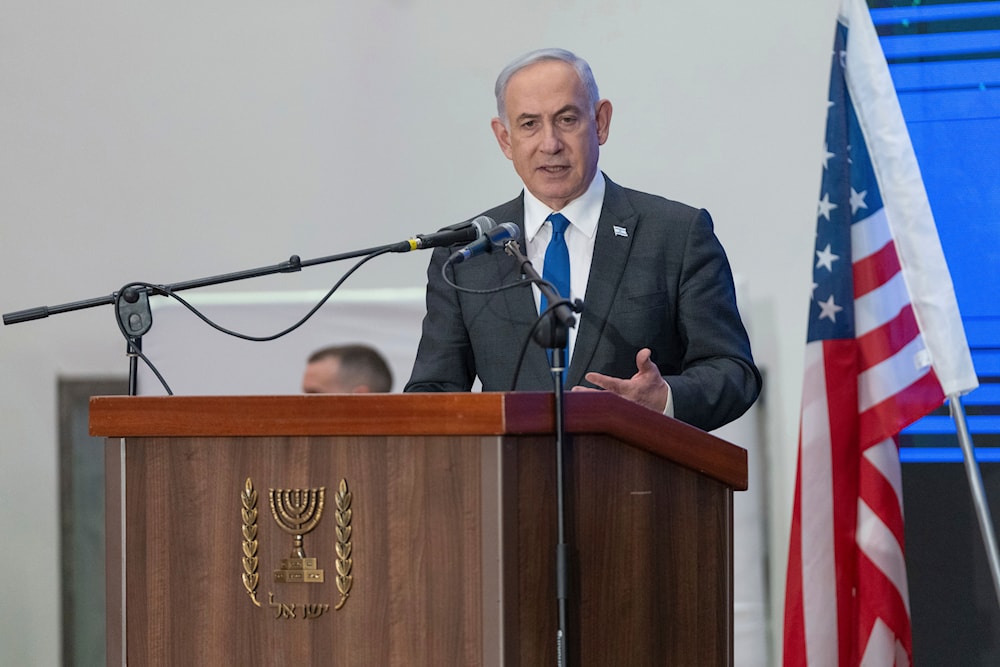Netanyahu's plan for 'after-war' Gaza: What are the main takeaways?
Benjamin Netanyahu has presented his plans for the "day after" the war on Gaza to the Israeli war cabinet.
-

Israeli Prime Minister Benjamin Netanyahu speaks at a conference in occupied al-Quds, the occupied West Bank, occupied Palestine, on February 18, 2024. (AP)
Israeli Prime Minister Benjamin Netanyahu has presented the Israeli war cabinet with a document of principles regarding the occupation's plots for the future of the Gaza Strip.
Although discussions regarding these plans have been framed under plans for the "day after" the war on the Gaza Strip comes to an end, the glaring proposition from the document is the continued direct occupation of several sectors in the Gaza Strip. Netanyahu said that the Israeli occupation forces will do so until the full "de-militarization" of the Strip is achieved, adding that their presence in the Gaza Strip will be indefinite.
So what are the main takeaways from the document?
- Israeli occupation forces will continue their war on the Gaza Strip until they achieve their preset goals for the Gaza Strip.
- This includes the "destruction of the military capabilities and governmental infrastructure of" the Palestinian Resistance;
- Returning all Israeli captives held in the Gaza Strip via military means;
- Removing "any security threat from the Gaza Strip" in the long run;
- Doing so via the indefinite presence of occupation forces in the Gaza Strip. - The complete de-militarization of the Gaza Strip, excluding a police force that will be collaborating with Israeli authorities.
- An invasion of the southernmost city of Rafah will be launched, which will be paired with the complete occupation of the Palestinian side of the Palestinian-Egyptian border — known as the Philadelphi Axis.
- Excavation work for "buffer zones" that section the Gaza Strip will proceed.
- Plans for the "de-radicalization" of the Gaza Strip by directly altering its educational system and controlling its mosques will be implemented.
- The United Nations Relief and Works Agency for Palestine Refugees in the Near East (UNRWA) will be dissolved and replaced with other international organizations.
- A local government that will only run civilian affairs will be established, which will be run by local collaborators who have no ties to the Palestinian Resistance.
- The reconstruction of the Gaza Strip with only commence after the "de-militarization" of the Gaza Strip is achieved and the implementation of the "de-radicalization" process begins.
No consensus
Many of the aforementioned policies have either been explicitly articulated by Netanyahu in press conferences or interviews or have circulated as rumors within media circles. However, the Israeli Prime Minister has yet to garner the support of members of the war cabinet and the members of the coalition government.
Some ministers and officials have called for the re-occupation of several areas of the Gaza Strip, calling for the expulsion of hundreds of thousands of Palestinians. Others have discussed plans for the emergence of a "Reformed Palestinian Authority (RFA)," which would be tasked with running civilian affairs in the Gaza Strip, an idea supported by the United States and other allies.
Nevertheless, Netanyahu's plots for the Gaza Strip disregard both notions and opt to push forward the heads of several clans that would supposedly collaborate with his government to ensure a smooth flow of affairs in the Gaza Strip. The plan itself has been a subject of criticism by Israeli media outlets such as The Times of Israel, which says that those yet-to-be-identified chieftains will lose legitimacy among Palestinians for collaborating with occupation authorities.
Relying on undecided partners
Furthermore, the document presented by Netanyahu mentions that several governments around the world will aid "Israel" in achieving its goals for the Gaza Strip. These partners are supposed to play essential roles in several vital sectors that would ensure the success of the plan. The glaring issue, however, is that these rumored and stated partners have publicly announced their opposition to the unconditioned implementation of the plans.
Virtually abandoning the Palestinian Authority (PA) and dismissing Hamas and the Palestinian Islamic Jihad (PIJ), it could be said that Netanyahu has thrown away any prospect for a "two-state solution" that the US, Saudi Arabia, Egypt, and the United Arab Emirates (UAE) have long called for.
According to The Times of Israel, the document concludes with two principles adopted by the government and the Knesset which are: "Israel outright rejects any international dictates regarding a permanent settlement with the Palestinians, which should only be reached through direct negotiations between the parties, without preconditions; and that Israel will continue to oppose the unilateral recognition of a Palestinian state, which it views as a 'reward for terror.'"
Egypt's role
The notion of taking full control of the Philedalphi Axis, which "Israel" had previously occupied before its unilateral withdrawal from the Gaza Strip in 2005, has been outright rejected by Egyptian authorities. Cairo believes that such an action would directly threaten its sovereignty and breach the terms of previous agreements reached between the two governments. Nevertheless, the document says that Egypt will play an important role in "securing" the border.
Saudi Arabia & the UAE's roles
According to Israeli analysts and outlets, Netanyahu also expects Saudi Arabia and the UAE to play a quintessential role in "de-radicalizing" Palestinians in the Gaza Strip, as Israeli authorities will need "the involvement and assistance of Arab countries that have experience in promoting de-radicalization."
However, Riyadh, in particular, has said that it will not carry on with plans to normalize ties with the Israeli occupation unless the latter allows for the establishment of a Palestinian state based on the 1967 territories.
Read more: Egyptian official denies involvement in Israeli Philadelphi Axis Plots

 5 Min Read
5 Min Read








